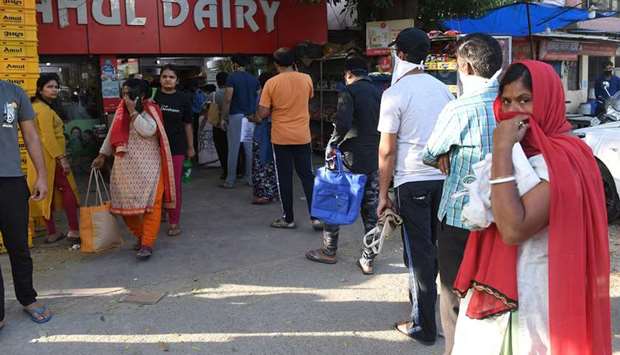Authorities yesterday sealed off several coronavirus hotspots in New Delhi and Uttar Pradesh in a bid to contain the spread of Covid-19.
In Delhi, the city government sad it has sealed 20 hotspots and completely banning all kinds of movements in those areas.
“The areas will be completely sealed while the administration will ensure door-to-door delivery of essential items,” Deputy Chief Minister Manish Sisodia said.
The Delhi government also said it was making it compulsory for people to wear masks if they step out of their homes.
In Uttar Pradesh too, the authorities sealed off several hotspots in 15 districts including Ghaziabad, Gautam Budh Nagar and Noida.
Essential commodities including groceries, vegetables, milk, medicines and others will be brought to the doorsteps of the people in these areas and people will not be allowed to go out, officials said.
Prime Minister Narendra Modi told a conference of political leaders yesterday that several state governments had asked for an extension of the lockdown to cope with the outbreak.
But he also said that India was facing serious economic challenges, according to a statement issued by his office.
Scenes of poor migrant workers and their families walking long distances on empty highways to their homes in the countryside after losing their jobs have increased pressure on Modi to reopen parts of the economy.
More than 80% of confirmed Covid-19 cases in India have been traced to 62 districts representing less than 10% of India’s landmass, according to government data.
These are concentrated in Maharashtra, home to financial capital Mumbai, Delhi, Tamil Nadu, Telangana and Kerala.
Many parts of the country have not reported a single case.
Such a skewed geographical spread strengthens the case for a more targeted approach under which the affected area and its neighbouring district would be cordoned off, health officials said.
“To manage coronavirus, we are working on a cluster containment strategy,” said Health Ministry joint secretary Lav Agarwal, leading the effort to tackle the outbreak.
He said such measures were already in place in east Delhi, in Agra, site of the famed Taj Mahal monument, and in the textile town of Bhilwara in Rajasthan which has become a test case for a more targeted fight against Covid-19.
Under the ‘Bhilwara model’, which was adopted last month soon after about 30 people tested positive in the first big wave of infections, the town and its surrounding villages were sealed off with a virtual curfew in place.
People were not allowed even to step out of their homes to get essential stocks or medicines, instead they were asked to call helpline numbers for delivery of staples to their homes.
“It is a lockdown, within a lockdown,” said district information officer Gouri Kant.
So far, India has registered 5,274 Covid-19 infections of whom 149 have died, government data showed yesterday.
The small numbers, in comparison to large countries such as the United States, Italy and China, have prompted questions from Modi’s critics about whether India has gone too far in shutting down its economy, throwing millions of those who depend on pay by the day out of work and onto the brink of poverty.
However, health experts say India needs to ramp up testing for infections to help ensure it has a grasp on how widespread the coronavirus is, and that a lockdown alone is no solution.
The Supreme Court said yesterday Covid-19 tests should be conducted free at all government and private laboratories.
So far, only government labs were conducting free tests, while the private labs had been allowed to charge a fixed rate of Rs4,500.
“The private hospitals including laboratories have an important role to play … by extending philanthropic services in the hour of national crisis,” the court said, ruling on a public interest litigation.
It was not immediately clear how and if the government would reimburse private sector’s costs.

People wait outside a store to buy groceries following Uttar Pradesh government’s decision to seal hotspots in 15 coronavirus-hit districts, in Ghaziabad yesterday.
